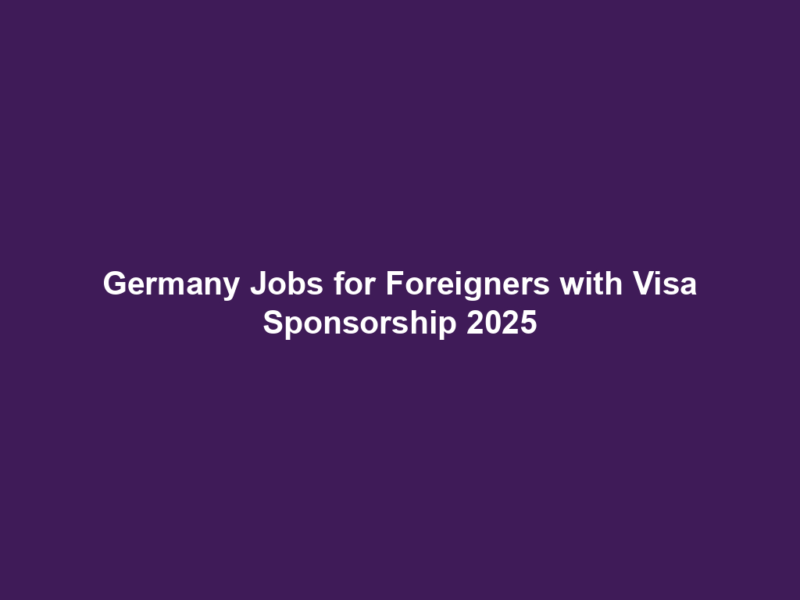Germany stands out as an attractive destination for international job seekers, even those without a university degree.
Renowned for its robust economy—the fourth largest globally with a GDP of approximately €4.5 trillion in 2025—and a welcoming stance toward skilled workers, Germany has implemented policies to address its labor shortage, estimated at over 400,000 workers by the Federal Employment Agency (BA).
This comprehensive guide explores the economic context, job opportunities with visa support and free housing, eligibility criteria, visa options, application strategies, living conditions, challenges, future outlook, and frequently asked questions (FAQs).
It provides a detailed roadmap for individuals aiming to move to Germany without a degree, leveraging visa sponsorship and housing benefits in 2025.
Economic Context and Labor Demand
Germany’s economy thrives on a diverse industrial base, including manufacturing, engineering, automotive, healthcare, and IT, contributing to its status as a global leader.
With an unemployment rate of around 6% in 2025, the country faces a significant labor shortage due to an aging population (over 20% of citizens are above 65) and a decline in domestic vocational training.
The Skilled Immigration Act, introduced in 2020 and expanded in 2024 with the Opportunity Card, reflects Germany’s commitment to attracting foreign talent, including those without academic degrees but with vocational skills or experience.
The demand spans various sectors, with employers offering incentives like visa support and, in some cases, free housing to attract workers. This is particularly evident in rural areas and industries facing acute shortages, such as construction, hospitality, and caregiving.
The country’s high quality of life—supported by a strong social security system, excellent infrastructure, and a rich cultural heritage (e.g., over 20,000 castles and 1,500 beer varieties)—further enhances its appeal.
With over 13 million foreign residents, Germany’s multicultural workforce facilitates integration, making it a viable option for degree-less job seekers.
Jobs with Visa Support and Free Housing
Germany offers a range of jobs that do not require a university degree but provide visa sponsorship and, in certain cases, free or subsidized housing. These opportunities are often tied to labor shortage occupations or employer initiatives to retain staff. Below are key roles, their responsibilities, salary ranges, and housing benefits:
1. Construction Worker (e.g., Laborer, Carpenter)
- Salary Range: €25,000 – €50,000 annually (€12 – €25/hour)
- Responsibilities: Perform manual tasks like site preparation, bricklaying, or woodworking, often requiring on-the-job training.
- Visa Support: Eligible under the Skilled Worker Visa or Opportunity Card with vocational experience.
- Housing Benefits: Some rural projects (e.g., in Bavaria) offer free on-site accommodation or subsidies (€200-€500/month).
- Demand Drivers: Infrastructure projects (e.g., Autobahn expansions) and a housing construction boom.
2. Caregiver/Nursing Assistant
- Salary Range: €25,000 – €40,000 annually (€12 – €20/hour)
- Responsibilities: Assist elderly or disabled individuals with daily tasks, with training often provided.
- Visa Support: H-2B-like temporary work visas or Opportunity Card with basic German (A1).
- Housing Benefits: Employers like care homes in Saxony offer free lodging or reduced rent.
- Demand Drivers: Aging population and a 50,000-worker shortage in elderly care.
3. Hospitality Staff (e.g., Waiter, Kitchen Helper)
- Salary Range: €20,000 – €35,000 annually (€10 – €18/hour, plus tips)
- Responsibilities: Serve customers, prepare food, and maintain cleanliness, with minimal experience needed.
- Visa Support: J-1 cultural exchange visa or H-2B for seasonal roles.
- Housing Benefits: Seasonal hotels in Black Forest regions provide free staff housing.
- Demand Drivers: Tourism surge in Bavaria and Berlin.
4. Warehouse Worker/Logistics Assistant
- Salary Range: €25,000 – €45,000 annually (€12 – €22/hour)
- Responsibilities: Handle goods, operate machinery, and support logistics operations.
- Visa Support: Skilled Worker Visa with vocational training or experience.
- Housing Benefits: Companies like Amazon in Rhineland offer subsidized housing near warehouses.
- Demand Drivers: E-commerce growth and logistics hub status.
5. Agricultural Worker
- Salary Range: €20,000 – €35,000 annually (€10 – €18/hour)
- Responsibilities: Plant, harvest, and maintain farms, often with seasonal contracts.
- Visa Support: H-2A visa for seasonal agricultural work.
- Housing Benefits: Free on-farm housing common in northern Germany.
- Demand Drivers: Food production needs and rural labor gaps.
6. Cleaner/Janitorial Staff
- Salary Range: €20,000 – €30,000 annually (€10 – €15/hour)
- Responsibilities: Clean offices, schools, or public spaces, requiring basic skills.
- Visa Support: Opportunity Card or employer-sponsored work permits.
- Housing Benefits: Some municipal contracts include free staff quarters.
- Demand Drivers: Urban development and facility maintenance needs.
7. Factory Worker
- Salary Range: €25,000 – €45,000 annually (€12 – €22/hour)
- Responsibilities: Assemble products or operate machinery in manufacturing plants.
- Visa Support: Skilled Worker Visa with vocational experience.
- Housing Benefits: Industrial firms in Saxony offer free or low-cost dormitories.
- Demand Drivers: Automotive and machinery production.
These jobs often provide free housing as an incentive, especially in rural or high-demand areas where accommodation costs (e.g., €800-€1,200/month in Munich) are a barrier. Salaries reflect the statutory minimum wage of €12.41/hour (2025) but can increase with experience or overtime.
Eligibility Criteria
To qualify for these jobs with visa support and housing, candidates must meet specific requirements:
- Work Experience: 1-3 years in a related field (e.g., construction, caregiving) is preferred, though entry-level roles accept minimal experience with training.
- Education: No degree required; a high school diploma or vocational training (e.g., 2-year programs) is sufficient for most roles.
- Language Skills: Basic German (A1 level) or English (B2) is often required, though some employers provide language support. Hospitality and tech roles may prioritize English.
- Skills and Certifications: Trade-specific skills (e.g., carpentry tools) or willingness to train are valued. Certifications like OSHA equivalents can be obtained in Germany.
- Age: No strict upper limit, but 18-40 is typical for visa programs; physical fitness is assumed for manual roles.
- Health and Character: Medical exams and police clearances are mandatory for visa approval.
Visa Options with Support
Germany offers several visa pathways for degree-less workers, often integrated with employer support:
Opportunity Card (Chancenkarte)
- Description: Allows a 12-month stay to seek employment, with trial work (2 weeks) or part-time work (20 hours/week).
- Requirements: 2+ years of vocational training or experience, A1 German or B2 English, €1,027/month financial proof (2025).
- Support: Points system (6+ points for age, skills) facilitates approval.
- Housing Tie-In: Employers may offer housing during the job search.
Skilled Worker Visa (Section 18a AufenthG)
- Description: For workers with recognized vocational qualifications or experience.
- Requirements: Job offer, comparable skills to German training, no salary minimum for non-regulated professions.
- Support: Employers handle petitions; housing often included.
- Duration: Up to 4 years, renewable.
H-2B Visa Equivalent
- Description: For temporary non-agricultural work (e.g., construction, hospitality).
- Requirements: Employer petition, labor shortage proof, fees (~€600).
- Support: Housing common in seasonal roles.
- Duration: Up to 9 months.
J-1 Visa (Cultural Exchange)
- Description: For trainees or au pairs, aged 18-30.
- Requirements: Program sponsorship, basic skills, fees (€160-€500).
- Support: Stipends and housing provided.
- Duration: Up to 12 months.
Freelance Visa
- Description: For self-employed workers with client demand.
- Requirements: Portfolio, financial stability (€1,000+/month), A1 German.
- Support: Housing negotiable with clients.
- Duration: 3 years, renewable.
Employers often cover visa costs (€75-€100) and provide housing, reducing financial barriers.
Application Strategies
Securing these jobs requires a strategic approach:
- Research Employers: Target firms like Siemens (manufacturing), Deutsche Post (logistics), or rural care homes. Use Make it in Germany, Indeed.de, and StepStone.de.
- Prepare Documents: Gather a passport, CV (in German/English), experience proof, and language certificates. A cover letter emphasizing skills and housing needs stands out.
- Network: Attend job fairs (e.g., virtual BA events), join expat forums (e.g., Toytown Germany), or contact recruiters via LinkedIn.
- Apply Directly: Submit applications online or in-person, highlighting flexibility and training willingness. Follow up within a week.
- Leverage Agencies: Use relocation firms (e.g., Move One Inc.) for visa and housing assistance (€500-€2,000 fees).
Persistence and targeting housing-offer roles increase success.
Living Conditions
Living costs vary by region. In Berlin, rent for a shared apartment averages €1,000/month, while in rural areas like Mecklenburg-Vorpommern, it’s €600.
Free housing offsets this, though utilities (€100-€200/month) and groceries (€250-€350/month) remain. Public transport costs €50-€100/month.
The healthcare system, spending 11% of GDP, offers universal coverage (€100-€200/month), with English-speaking doctors available. The multicultural environment, with 13 million foreigners, aids integration, though basic German (A1) is recommended.
Benefits of Jobs with Visa Support and Free Housing
- Financial Relief: Free housing reduces living costs by €600-€1,200/month.
- Legal Work Status: Visas enable employment for specified durations.
- Career Growth: Opportunities to upskill (e.g., caregiving to nurse).
- Settlement Potential: Paths to permanent residency with employer support.
Challenges and Mitigation
- Language Barrier: Basic German (A1) is often required. Enroll in free courses (e.g., Volkshochschule) or use English-friendly employers.
- Housing Competition: Free housing is limited. Apply early and target rural areas.
- Visa Costs: Residual fees (€500-€2,000) need savings or employer negotiation.
- Bureaucracy: Complex processes delay applications. Use relocation services.
- Job Security: Temporary roles may end. Seek long-term contracts.
Future Outlook
Germany’s labor shortage is projected to worsen, with a 5-7% industry growth rate through 2030. The Opportunity Card and Skilled Immigration Act expansions may increase visa quotas, though language requirements could tighten.
Automation (e.g., robotic warehousing) may reduce some roles, but manual trades will remain essential. Monitoring BA updates and industry trends will be key.
Conclusion
Moving to Germany without a degree is achievable in 2025 through jobs with visa support and free housing, spanning construction, caregiving, hospitality, logistics, agriculture, cleaning, and manufacturing.
With a labor shortage driving employer incentives, viable visa options like the Opportunity Card and Skilled Worker Visa, and a supportive living environment, the pathway is accessible.
By meeting eligibility criteria, employing strategic applications, and navigating challenges with planning, international workers can secure these opportunities. As Germany continues to open its doors, now is the time to act—research, apply, and start your new life in Germany.
Frequently Asked Questions (FAQs)
1. Can I move to Germany without a degree and get a job with visa support?
Yes, Germany offers jobs with visa support for those without degrees, such as construction workers, caregivers, and warehouse staff, especially under the Opportunity Card or Skilled Worker Visa, provided you have vocational experience or skills.
2. What jobs in Germany provide free housing without a degree?
Jobs like construction workers, agricultural workers, caregivers, and hospitality staff in rural or seasonal roles often offer free housing, particularly with employers addressing labor shortages in regions like Bavaria or Saxony.
3. Do I need to speak German to work in Germany without a degree?
Basic German (A1 level) is often required for visas like the Opportunity Card or Skilled Worker Visa, though some English-friendly roles (e.g., IT support, hospitality) exist. Employers may provide language training.
4. How long does the visa process take?
The process varies: Opportunity Card takes 2-4 months, Skilled Worker Visa 3-6 months, and J-1 visas 1-3 months. Delays can occur due to documentation or employer petitions, so apply early.
5. Can I bring my family with me?
Dependents (spouse, children under 18) can apply for derivative visas (e.g., family reunification), but they cannot work unless authorized. Additional fees (€100 per dependent) apply, with health and character checks required.
6. What is the minimum salary for these jobs?
There’s no fixed minimum for non-regulated roles, but the statutory wage is €12.41/hour (2025), with many jobs paying €20,000-€50,000 annually. Housing offsets living costs.
7. Do I need a job offer before applying for a visa?
Yes, most visas (e.g., Skilled Worker) require a job offer, except the Opportunity Card, which allows a 12-month job search with a trial work option.
8. What are the costs involved?
Costs include visa fees (€75-€100), employer petitions (€200-€600), medical exams (€200-€400), and optional legal fees (€500-€2,000). Free housing reduces overall expenses.
9. Can I stay permanently after getting a work visa?
Temporary visas (e.g., Opportunity Card: 12 months, Skilled Worker: 4 years) offer paths to settlement permits with 5 years of residence and B1 German, subject to employer support.
10. What if my qualifications are from another country?
Overseas vocational training needs recognition by German authorities (e.g., ZAB, €200-€300), but experience can suffice. Employers may sponsor training.
11. Are there age restrictions?
No strict upper limit, but 18-40 is typical for visa programs. Physical fitness is key for manual roles.
12. How can I find employers offering visas and housing?
Target firms like Siemens, Deutsche Post, or rural care homes via Make it in Germany, Indeed.de, or relocation agencies. Attend job fairs or network on LinkedIn.
13. What if my visa application is rejected?
Rejections may stem from insufficient funds or documentation. Appeal within 30 days (€100) or reapply after corrections, consulting an immigration lawyer.
14. What support is available for new arrivals?
Settlement services (e.g., BA integration courses) offer language training and job guidance. Employers may provide housing and orientation.
15. How does the labor shortage affect my chances?
The 400,000+ worker shortage increases employer willingness to sponsor visas and offer housing, especially in shortage occupations, though competition for spots remains.
These FAQs clarify the process, empowering candidates to pursue opportunities in Germany effectively.


